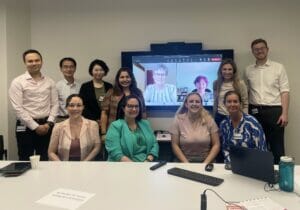Click here for the DCED’s inter-agency knowledge page on WEE.

WEE WG Members at the DCED 45th Annual Meeting in Geneva and online
Objectives
Private sector development represents a powerful way to address gender inequalities and empower women both economically and socially. At the same time, engaging women in productive employment can have economy-wide benefits.
The Women’s Economic Empowerment Working Group aims to harness knowledge and experience among DCED member agencies and PSD practitioners on how to integrate gender and WEE considerations more strategically and effectively into their work. Ultimately, it seeks to enhance the economic development and poverty reduction impact of PSD programmes by helping to increase their knowledge, capacity and incentives to address relevant constraints and needs of both women and men equally. The WEE WG is currently Chaired by IDRC (International Development Research Centre, Canada).
Recent publications & resources
Case studies on WEE and climate change
This is a series of five briefs that challenges the dominant narrative that portrays women as victims of climate change, instead portraying women as active agents of change. Briefs 1 to 4 each highlight a different theme under the umbrella of WEE and climate change. Brief 5 presents donor good practices that emerged from the four preceding briefs, in the hope of inspiring donors to advance women‘s economic empowerment to address climate change.
- Redefining Power: Women-Led Sustainable Energy Solutions, DCED, 2024
- Fighting for Climate Justice: Empowering Women to Advocate on Climate Change Issues, DCED, 2024
- Natural Resource Management: Empowering Women, Nurturing Nature, DCED, 2024
- Sowing Change: Women in Food Systems and Climate Change, DCED, 2024
- Seeding Success: Donor Strategies for Supporting Women-Led Climate Initiatives, DCED, 2024
Other recent work
- The WEE Gateway, the place to help you find the right resources to increase your knowledge about implementing private sector development (PSD) programmes in a gender-sensitive way to promote women’s economic empowerment (WEE).
- Childcare Solutions for Women Micro and Small Enterprises, DCED, 2022: A report offering four solutions for childcare for women MSEs, including case studies and recommendations.
- Donor Engagement in Gender-lens Investing: Approaches and opportunities, DCED, 2022: A report outlining possible areas of GLI where donors can best be involved, including an annotated bibliography.
- Donor Responses for Promoting Women’s Economic Empowerment During COVID-19, DCED 2021: A policy brief outlining how DCED members should adjust their programmes to ensure that WEE is supported throughout the COVID-19 pandemic.
- Gender-Responsive Green Growth Guidance Sheets: A series outlining the state of the art and current examples, all by Katherine Miles for DCED, 2019.
- On the Move: Women’s Economic Empowerment in Contexts of Migration and Forced Displacement, DCED, 2019. This scoping study documents the state of practice of WEE in the context of migration and forced displacement, identifies relevant gaps in current knowledge and recommends potential PSD initiatives in the field.
- How to Integrate Gender and WEE into PSD Programmes, DCED 2017. Structured around the DCED Standard for Results Measurement, linking to proven guidance. The document points to ‘minimum’ activities that all programmes should aim for, and additional elements they can work towards to become more effective in achieving pro-poor benefits for women and men alike. It builds on the 2014 Guidelines on measuring WEE in PSD which in turn built on the 2013 literature review of household-level indicators and impacts of women’s economic empowerment.
- How to put Gender and WEE into practice in M4P – A Description of the Ethos, Systems and Tools used in the Alliances Programme in Georgia by Helen Bradbury, ALCP Georgia, 2016. Summarises experience in managing a programme that integrates gender issues and M4P throughout the project cycle.
Ongoing work
The WEE WG is currently working on the following themes:
- Continuing to share knowledge on gender and WEE, including through podcast episodes and webinars (examples below)
- Donor engagement in gender lens investing
- The nexus between the care economy and climate change
Recent webinars
| Women Entrepreneurs: Essential Actors in Climate Action (en français), in collaboration with the Green Growth Knowledge Partnership, moderated by Olola Vieyra-Mifsud and Anna-Noémie Ouattara Boni (both GGGI) , with Ndèye Marie Rose, cooperative leader at the largest landfill in Dakar, Senegal, and Abidate Abdourahamane, biomass business owner, Comoros. October 2024. | |
| Promoting Women’s Economic Empowerment During COVID-19, moderated by Selina Haeney (SDC) & Gillian Dowie (IDRC), with Kate Grantham & Leva Rouhani (FemDev Consulting), Navya D’Souza (Homenet), Emma Caddy (Tiny Totos) and Clara Popeo (Incluyeme), February 2022. | |
| Transformative Approaches to WEE in Practice: Case studies from Africa, presented by Kerry Selvester (MUVA), Charleine Mbuyi-Lusamba and Adriana Sierra (Women’s Entrepreneurship Development Programme/ILO), and Hania Elkady (Econowin/GIZ), March 2020. | |
| What Do Men Have to Do with WEE? Lessons and Challenges, presented by Gary Barker (Promundo), January 2020. | |
| Profiting from Parity: Unlocking the Potential of Women’s Businesses in Africa, presented by Francisco Campos (Africa Gender Innovation Lab, World Bank), November 2019. |
More information
- Meeting Minutes of the Women’s Economic Empowerment Working Group
- The WEE Gateway, the place to help you find the right resources to increase your knowledge about implementing private sector development (PSD) programmes in a gender-sensitive way to promote women’s economic empowerment (WEE).
- WEE Talks, the WEE WG podcast with episodes on the care economy and COVID-19.
- Women’s Economic Empowerment page of the DCED’s Knowledge Portal on PSD
- Women’s Economic Empowerment Webinar Library